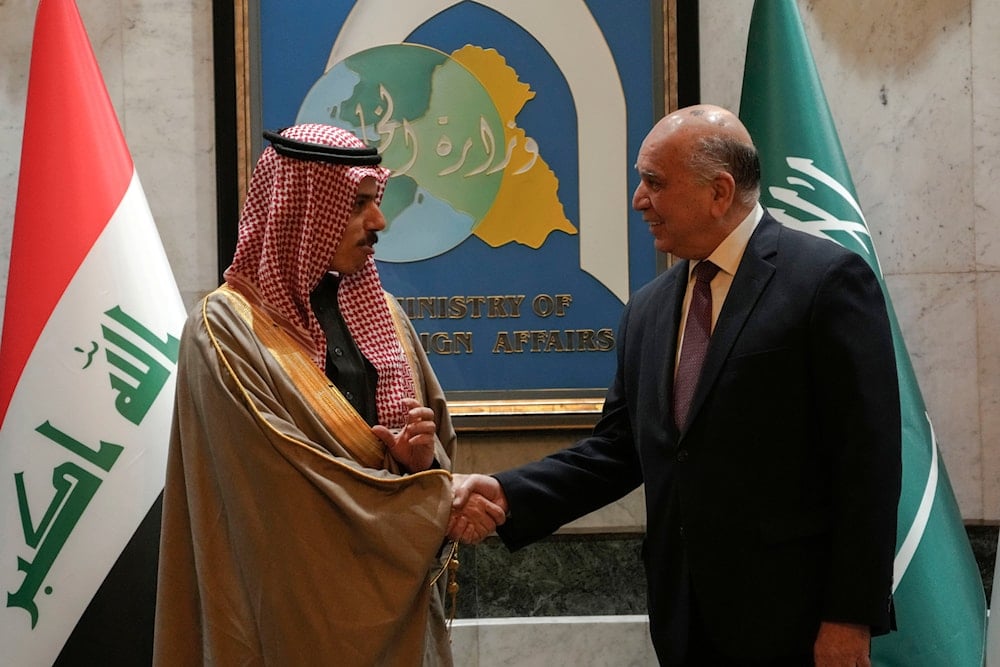Iraq, Saudi Arabia affirm importance of backing Iran nuclear talks
Iraq and Saudi Arabia's foreign ministers stress the importance of nuclear negotiations with Iran and condemn "Israel's" aggression, highlighting the need for regional cooperation and stability.
-

Iraqi Foreign Minister Fouad Hussein, right, shakes hands with Saudi Foreign Minister Prince Faisal Bin Farhan Al Saud before their talk in Baghdad, Iraq, Thursday, Feb. 2, 2023. (AP)
Iraq's Foreign Minister discussed with his Saudi counterpart the latest developments in the regional security situation, amid the explosive tensions between Iran and "Israel".
Iraqi FM Fuad Hussein and his Saudi counterpart, Faisal bin Farhan, emphasized during a phone call on Friday the importance of supporting the talks on Iran’s nuclear program and ensuring the continuity of related meetings and talks.
During their discussion, the ministers also examined recent security developments in the region, particularly in light of the Israeli aggression against Iran and the potential consequences for regional stability. The two sides discussed the internal situation in Iran, according to a statement from Iraq's Foreign Ministry.
The two ministers emphasized the need to strengthen regional coordination and maintain ongoing communication and cooperation between Iraq and Saudi Arabia to address current challenges and safeguard regional security and stability.
Saudi Arabia condemned yesterday's flagrant Israeli attacks against Iran, which it described it as a "brotherly nation," while emphasizing that the international community, particularly the UN Security Council, must take urgent action to stop this aggression.
'Israel' attacks, Iran retaliates
"Israel" launched a major attack on Iran in the early hours of Friday, targeting residential buildings, nuclear facilities, and military infrastructure across Iran.
The Israeli occupation military confirmed at dawn Friday the launch of a broad aerial offensive targeting Iran’s nuclear program. In an official statement, the occupation military said it carried out a “precise, preemptive strike” in Iran, “with the goal of damaging Iran’s nuclear program."
Iran State TV reported that the Israeli aggression targeted the Islamic Revolution Guard Corps' HQ in Tehran.
Iran confirmed the martyrdom of the Commander-in-Chief of the IRGC, Major General Hossein Salami. Several other commanders, including Brigadier General Amir Ali Hajizadeh, the chief of the IRGC's Aerospace Forces, as well as multiple nuclear scientists, were also assassinated.
"Israel" also attacked residential neighborhoods, killing dozens of civilians in Tehran alone, including women and children. According to state media reports, Israeli strikes have resulted in at least 130 fatalities in Tehran, an uptick from Friday's reports, which reported 78 deaths, with additional casualties reported across other Iranian cities, though no official death toll has been released yet.
Iran launches Operation True Promise 3 in retaliation to Israeli attacks
In response, Iran launched Operation True Promise 3, which began with massive waves of missiles targeting Tel Aviv and northern occupied Palestine. According to Israeli media, the retaliation left four settlers dead, and over 200 others wounded, as unprecedented destruction tore through targeted occupied areas.
Iran later launched a missile salvo aimed at Tel Aviv and extensive regions in northern occupied Palestine, according to Israeli media reports in the early hours of June 14, putting the entirety of "Israel" on high alert.
Meanwhile, the Israeli occupation admitted that two settlers were killed and 40 others wounded in the bombardment of Rishon LeZion in central occupied Palestine.
'Israel' attacks Tabriz, Iranian air defense intercepts missiles
On June 14, loud explosions reverberated through the city of Tabriz in northwestern Iran amid another Israeli strike.
#WATCH | Israeli aggression on Tabriz, #Iran. pic.twitter.com/z2aPBTbPMj
— Al Mayadeen English (@MayadeenEnglish) June 14, 2025
According to Tasnim News Agency, Iranian air defense systems were engaged to intercept Israeli missiles over multiple cities, including Tabriz, Khorramabad, and Kermanshah, while Iranian media later confirmed that the Tabriz oil refinery had escaped any damage despite the strikes.
Israeli strikes targeted the Shahid Chamran residential complex in Tehran on Saturday, killing an estimated 60 people, including 20 children.
The Secretariat of Iran's Supreme National Security Council later announced that Iran had finalized all required domestic preparations to continue its sustained military operations against "Israel," emphasizing the nation's readiness for prolonged engagement.
Earlier, the semi-official ISNA news agency reported that Iran had confirmed its Fordow nuclear facility suffered limited damage as a result of recent Israeli attacks.
Behrouz Kamalvandi, spokesperson for Iran’s Atomic Energy Organization, stated that there had been limited damage to some areas at the Fordow enrichment site, while clarifying that much of the sensitive material and equipment had been relocated beforehand, which helped minimize the impact of the strikes.
"We had already moved a significant part of the equipment and materials out, and there was no extensive damage, and there are no contamination concerns," he added.

 4 Min Read
4 Min Read









